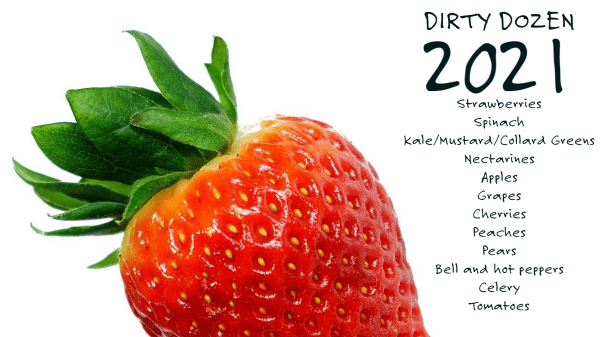Thomas Galligan PhD a toxicologist with the EWG explains that the Dirty Dozen is not a list of fruits and vegetables to avoid. So the residues found in these studies are likely to be the same.
 Dirty Dozen Clean 15 Lists Released For 2021 Produce Blue Book
Dirty Dozen Clean 15 Lists Released For 2021 Produce Blue Book
Conversely the Dirty Dozen is a list of fruit and vegetable varieties on which EWG experts detected the highest pesticide levels even after being washed.

Dirty dozen vegetables. Published 0442 GMT 1242 HKT March 20 2019. The EWG 2021 Dirty Dozen list has been released and experts have added more leafy greens and bell peppers for their elevated levels of pesticide. Share 1 of 12.
The 2021 Dirty Dozen list of pesticide-laden fruits and vegetables Nectarines Nectarines are fourth on the list this year. Therefore the EWG recommends US. In addition to the traditional Dirty Dozen EWG releases a Dirty Dozen Plus list that contains 36 more fruits and vegetables that have high levels of pesticide residues including hot peppers.
At the top of the list for the third year in a row are strawberries. In conducting these tests the produce is made plate-ready before being tested. The Dirty Dozen is a trademark term used to define the twelve crops that farmers typically use the most pesticides on versus the Clean 15 which is also a trademark term to describe the fifteen fruit and vegetable that have the lowest amount of pesticide residue.
Strawberries topped the list in 2019 for the fourth year in a row. The Environmental Working Group has released the 2020 version of its annual Dirty Dozen list. Washed peeled and ready to eat.
Amanda Tarlton Updated. Strawberries kale and spinach continue to top the list of 12 different vegetables and fruits that. Shoppers buy organic versions of these items whenever possible.
Rather the EWG recommends that consumers choose organic versions of these twelve Dirty Dozen items if available and affordable. The second vegetables added to this years Dirty Dozen are bell peppers and hot peppers which ranked at No. According to investigations by the EWG more than 90 of strawberries apples cherries spinach nectarines and kale all tested positive for residual traces of two or more pesticides.
Check out EWGs Dirty Dozen list to help decide when you should splurge for organic produce part of our annual Shoppers Guide to Pesticides in Produce. EWG released its annual Dirty Dozen and Clean 15 lists highlighting the fruits and vegetables most and least likely to harbor pesticide residues. The Dirty Dozen.
These fruits and vegetables should be bought organic when possible since they are the most heavily sprayed crops. Experts agree that even with the growing concern for the effects of pesticides fruits and vegetables are an important part of a daily diet. Basically while there are studies linking excessive pesticide exposure to various health issues and while the Dirty Dozen and Clean Fifteen are great guides for limiting your pesticide intake its still better to eat conventional fruits and vegetables rather than no fruits and vegetables at all.
Article continues below advertisement. Mustard greens join the 2021 Dirty Dozen. The 2019 pesticide Dirty Dozen fruits and vegetables.
Collard and mustard greens join kale in. More than 90 of samples of strawberries apples cherries. Their guide identifies the least and most contaminated produce the Dirty Dozen and Clean 15 based on thousands of tests conducted by both the USDA and the FDA.
14 2018 The Dirty Dozen refers to 12 fruits and vegetables most likely to be covered in pesticide residue. Celery ranks 11th on the Dirty Dozen list. Strawberries are high on the contamination list again this year but spinach and pears were also highlighted for extreme pesticide residues.